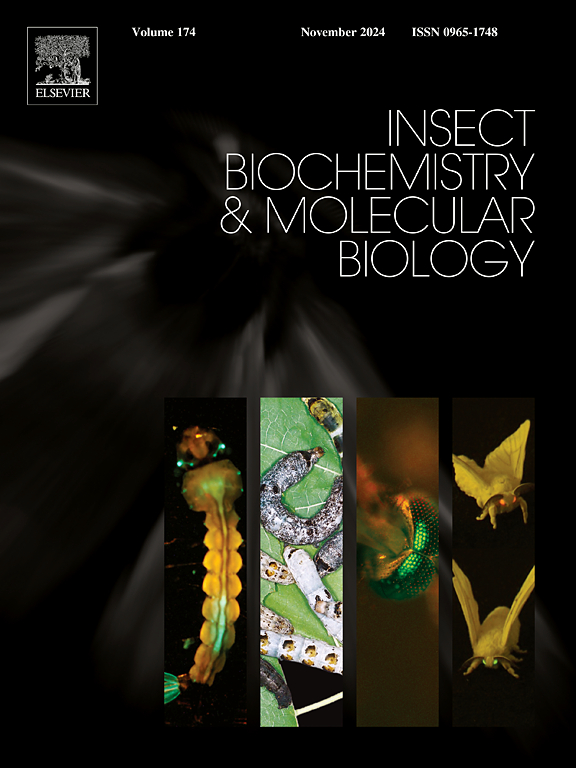Laterally acquired chitinase genes in venom facilitate parasitism in egg parasitoid wasps
IF 3.7
2区 农林科学
Q2 BIOCHEMISTRY & MOLECULAR BIOLOGY
引用次数: 0
Abstract
Parasitoid wasps (Hymenoptera) play a crucial role in ecosystems and agroforestry pest management as biological control agents. These wasps utilize venom proteins to suppress host immunity and regulate physiology, facilitating offspring development. Although venom functions have been studied in some parasitoids, their roles in egg parasitoids remain poorly understood. In this study, we employed genomic and transcriptomic sequencing to identify venom proteins in Anastatus japonicus and Anastatus fulloi, two egg parasitoids used in biological control. We discovered a significant expansion of GH19 chitinase in their genomes, with phylogenetic analysis indicating acquisition via lateral gene transfer (LGT) from microsporidian. Functional characterization revealed that four highly expressed GH19 chitinases, Aj13071/Aj13072 in A. japonicus and Af23628/Af23629 in A. fulloi are essential for host egg penetration; silencing these genes increased penetration time and resulted in smaller or incomplete holes. Additionally, silencing Aj13071 and Aj13072 in A. japonicus impaired female fecundity, while Af23628 and Af23629 in A. fulloi affected venom reservoir development and egg load, respectively. These findings underscore the critical roles of GH19 chitinases in host penetration and reproduction, offering new insights into the molecular mechanisms driving parasitism in egg parasitoids. This study advances our understanding of venom evolution and supports the development of targeted biological control strategies.

毒液中侧向获得的几丁质酶基因促进了卵类寄生蜂的寄生。
寄生蜂(膜翅目)作为生物防治剂在生态系统和农林病虫害治理中发挥着重要作用。这些黄蜂利用毒液蛋白抑制宿主免疫和调节生理,促进后代发育。虽然已经研究了毒液在一些类寄生物中的作用,但它们在卵类寄生物中的作用仍然知之甚少。本研究采用基因组测序和转录组测序技术,对两种用于生物防治的卵寄生蜂——日本Anastatus japonicus和fulloi的毒液蛋白进行了鉴定。我们发现GH19几丁质酶在它们的基因组中显著扩增,系统发育分析表明是通过微孢子虫的侧基因转移(LGT)获得的。功能鉴定结果表明,4种高表达的GH19几丁质酶(Aj13071 / Aj13072)和Af23628 / Af23629是侵染寄主卵所必需的;沉默这些基因增加了穿透时间,导致更小或不完整的孔。另外,在日本刺蜂中沉默Aj13071和Aj13072会影响雌性的繁殖力,而在中华刺蜂中沉默Af23628和Af23629会分别影响毒液库的发育和卵量。这些发现强调了GH19几丁质酶在寄主渗透和繁殖中的关键作用,为卵类寄生物寄生的分子机制提供了新的见解。这项研究促进了我们对毒液进化的理解,并支持了有针对性的生物控制策略的发展。
本文章由计算机程序翻译,如有差异,请以英文原文为准。
求助全文
约1分钟内获得全文
求助全文
来源期刊
CiteScore
7.40
自引率
5.30%
发文量
105
审稿时长
40 days
期刊介绍:
This international journal publishes original contributions and mini-reviews in the fields of insect biochemistry and insect molecular biology. Main areas of interest are neurochemistry, hormone and pheromone biochemistry, enzymes and metabolism, hormone action and gene regulation, gene characterization and structure, pharmacology, immunology and cell and tissue culture. Papers on the biochemistry and molecular biology of other groups of arthropods are published if of general interest to the readership. Technique papers will be considered for publication if they significantly advance the field of insect biochemistry and molecular biology in the opinion of the Editors and Editorial Board.

 求助内容:
求助内容: 应助结果提醒方式:
应助结果提醒方式:


